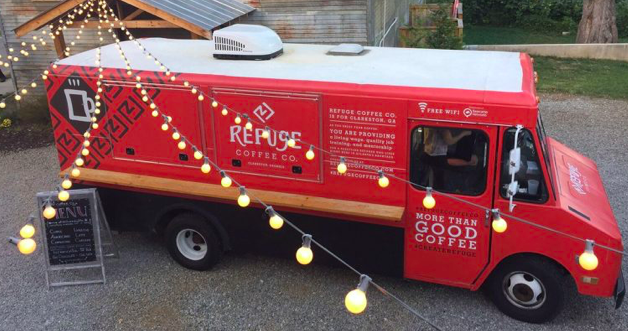Growing in popularity across the country, but especially in the South, are food truck parks. In the city of Austin alone there are more than seven food trucks parks you can dine at.
Food truck parks are locations that a group of food trucks gather together to operate in one spot. Often there are permanent spots for diners to come and sit down on park benches and tables. These locations also have regular hours of operation much like a restaurant so customers know exactly when and where their favorite spots are serving. One good comparison is that these places are a lot like a more modern and gourmet twist on the shopping mall food court. A lot of food trucks gather to provide a large selection of eating options and share a communal dining area for guests.
Food truck parks have a number of distinct advantages for vendors. First, the daily operations can be a lot simpler. Moving from location to location sometimes multiple times per day is not only exhausting, but makes doing business more expensive due to non-revenue generating drive time, the cost of gas, and meal prep.

Built by M&R Specialty Trailers and Trucks.
Food truck parks can make the operations of a truck easier because you can leave the vehicle in a semi-permanent location. These locations are often equipment with electricity, basic water hookup, lighting, tables, and other amenities that make things easier. Since you are banding together with other food truck businesses, there’s also the opportunity to cross promote and get introduced to a new customers.
But not all food truck parks are created equal. Sometimes food truck parks take more than they give in return to vendors. Just like renting a space at a strip mall, sometimes lease agents demand too much money to make it worth it for you as a business operator. In the case of a food truck park, if you are charged high weekly rates with little foot traffic in return you won’t get the ROI you need to support the business. Here are a few tips to ensure the food truck park you’re considering has the profitability potential.
Visit During Lunch and Dinner Hours
Before signing a lease with a food truck park, check it out as a customer during busy time like Friday evenings or lunch depending on the location. This is one of the easiest ways to determine if the location has potential or if you’ll be sitting around twiddling your thumbs. If other food trucks have long lines and are busy serving food while you visit that is a great sign. If you are one of only a handful of customers, you need to seriously question whether or not the spot has the potential to make you money.
Beware of Vacant Vending Spots
Are there a lot of vacant vending spots? While this may seem like a good sign because there will be less competition, it’s not usually what you want to see. Food truck parks that are profitable don’t have many open vending spots because the vendors want to stay in a location that brings in customers and revenue for as long as possible. If spots are empty, it usually means the location hasn’t been profitable for others.
Ask Other Vendors for Feedback
Another simple way to evaluate the quality of the location is the reach out to other vendors at the park. The best way to conduct this outreach is by email or Facebook direct message. Keep your outreach short and to the point. State that you are thinking about becoming a vendor there and ask if they would recommend the park.
Don’t approach the vendor directly at an on-site visit in most cases. If you approach the vendor during a lunch hour on-site, they probably won’t have time to talk. Also, you might be speaking with an employee instead of the owner, who won’t have insight into the business side.
Ask Questions to Owner or Lease Agent
Finally, you should be ready with questions for the lease agent or owner of the food truck park. Just be sure to take everything with a grain of salt here. Always ask if it’s possible to get a lower introductory lease at a short term when getting started. You don’t want to get locked into a longterm commitment until you’re absolutely sure the location gets enough traffic.
At a farmer’s market, for example, you are often able to rent a spot for a few days. Sometimes you can structure similar arrangements with a food park. If the location ends up being profitable, ask how you can become an anchor vendor.
You should also ask about traffic expectations and demographics of visitors at the park. Are most of the visitors coming during lunch breaks Monday – Friday? Are weekends the best days? How many people can you expect to visit the park on a weekly basis? When are the slow periods of year? Ask if water and electric are provided with the rent? Also, ask about overnight security if it applies. These are all questions that the lease agent should be able to estimate.
Don’t forget to read the details of your lease agreement too!
In conclusion, the food truck park is worth looking at if you have one in your area. Just make sure to complete your due diligence and understand the costs before signing a longterm agreement. This way of eating is growing in popularity across the United States and is probably here to stay. Food courts like this are already a long-standing tradition in places like Southeast Asia.

